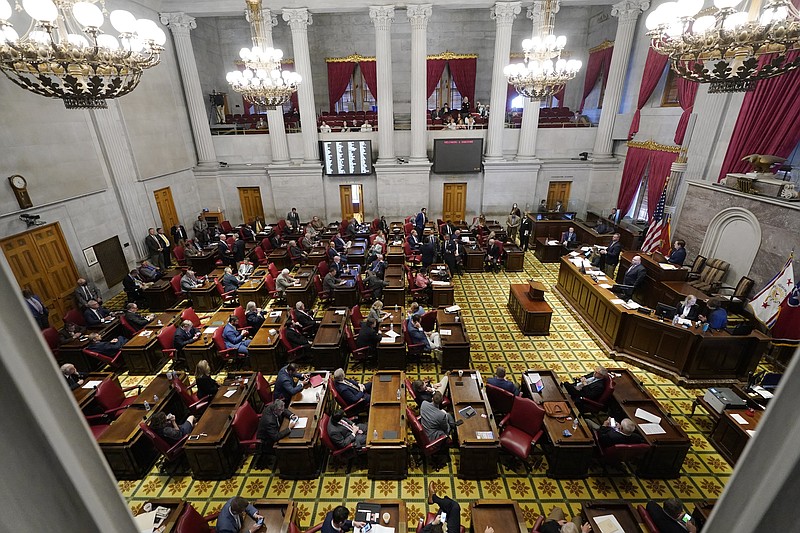NASHVILLE - Tennessee public college and university students, faculty and staffers may soon be able to sue public colleges if they think they're being punished for not agreeing with "divisive concepts" like race and gender theories under a bill approved Monday by the Republican-controlled Senate.
The bill, which charges the concepts "inflame divisions," was approved in the Senate on a 25-5 vote. Senators were acting on a previously passed House version sponsored by House Speaker Cameron Sexton, R-Crossville. It now goes back to the House where it remains unclear whether the lower chamber will agree to changes made by Senate Republicans.
The measure is a follow-up to a controversial 2021 Tennessee bill dealing with "critical race theory" in public K-12 education. It is one of several measures Republicans have introduced this year following up on such issues. The main difference is a House requirement that higher education officials investigate complaints. The Senate version omits that. Both bills allow lawsuits.
Definitions in the bill for what constitutes a "divisive concept" include stating that one race or sex is "inherently superior or inferior to another" and that an individual by virtue of race or sex is "inherently" privileged, racist, sexist or oppressive whether consciously or subconsciously.
"The amendment seeks to protect students and employees in public higher education institutions from being forced to believe or embrace divisive concepts on the basis of sex, race, ethnicity, religion, color, national origin or criteria," Sen. Mike Bell, R-Riceville, told colleagues.
The bill seeks to prevent higher education officials from requiring students or employees to endorse a specific political ideology or viewpoint to be eligible for hiring, tenure, promotion or graduation. Such information can still be presented but if students, professors and staffers disagree with it, that cannot be used against them.
Senators' amended version also requires that when higher education institutions conduct student surveys on the issue, they are required to present those findings to the Senate Education Committee and House Finance Committee.
Last week, Bell delayed a floor vote, saying he had concerns about opening up higher education officials to lawsuits, and the Senate version removes that provision.
Sen. Brenda Gilmore, D-Nashville, spoke out against the bill.
"I think it puts a chilling effect on our professors and our universities," Gilmore said. "I also think we're taking lots of the latitude and the freedom away from our professors and administrators to teach. I'm feeling they're jeopardizing their funding in their colleges and universities."
Sen. Frank Niceley, R-Strawberry Plains, said the legislation is necessary. He recalled receiving a single "D" grade while attending the University of Tennessee-Knoxville in 1969 in a political science class.
"I had a young Democrat teacher not much older than I was, and he wanted class participation, but he didn't want mine," Niceley said. "The amazing thing is I was smart enough to realize that if I would shut up, I could save my D and not sink down to an F."
Countered Senate Minority Leader Jeff Yarbro, a Nashville attorney: "I don't think what we've got in these definitions is exactly clear, and I think what it does is invites conflict and invites challenge."
Neither Sexton nor other GOP lawmakers have provided specific examples in which students, staffers or faculty have gotten into trouble for their views. The Sexton/Bell bill is seen as a less-harsh version of similar efforts by other GOP lawmakers. Sexton has described his bill, House Bill 2670, as "proactive."
Lt. Gov. Randy McNally, the Republican Senate speaker, supports the legislation.
"I think you need to teach the facts and not editorialize against certain races or beliefs," McNally told reporters earlier this month.
The legislation is among a raft of bills the GOP super majority has pushed in the past few years. Besides the K-12 bill on "divisive concepts" last year, Republicans also passed a bill banning the teaching of "critical race theory" in public schools, preventing public schools.
Critical race theory holds that discrimination is embedded in the criminal justice system, education system, jobs, housing markets, health care, laws, regulations and other areas. It holds this inherent discrimination leads to different outcomes based on race.
Besides Bell, Sens. Bo Watson, R-Hixson, Todd Gardenhire, R-Chattanooga, and Janice Bowling, R-Tullahoma, all voted yes.
The lone Republican to cast a no vote was Sen. Richard Briggs, R-Knoxville, who recalled his time in college. Briggs said students and faculty members are generally not concerned about expressing their differences in class.
Contact Andy Sher at asher@timesfreepress.com or 615-255-0550. Follow him on Twitter @AndySher1.
